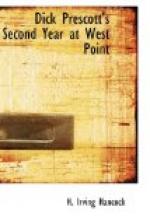“Mr. Dodge,” replied Anstey sternly, “honor is the watchword in the United States Military Academy, and all through the Army. We couldn’t spare a dishonorable wretch like you, suh, without sharing in your disgrace. And I have not told you all that we require. As soon as you have gone to your home you will write a letter to the superintendent, exonerating Mr. Prescott from all suspicion in that fearful affair. You will admit that you alone were guilty. According to custom, that letter will be read before the battalion in special orders and the entire corps will then know how fully Cadet Prescott is worthy of being one of us.”
“Write that letter?” demanded Dodge, leaping to his feet, but cowering. “Never! You are taking an unfair, unmanly, ungenerous advantage of me! You shall never have any such letter from me!”
CHAPTER XXIV
CONCLUSION
Still patiently Anstey turned to Greg.
“Mr. Holmes, will you be kind enough to go to the room of Mr. Packard of the first class, also Mr. Maitland, of the second class, and present my very respectful compliments? Will you ask both gentlemen if they can make it convenient to come here, forthwith, on a matter of corps honor?”
Greg departed. He was back within five minutes, simply nodding. Very soon Mr. Packard and Mr. Maitland appeared. They listened silently while Anstey laid the story before them. Then Packard glanced at the second classman.
“Shall I speak for us both, Maitland?”
“If you please.”
“Mr. Anstey, and gentlemen,” continued Packard, “this is primarily a matter affecting your own third class, and should be settled by the members of your class. But, in its broader scope, the conduct to which Mr. Dodge has confessed affects the entire corps. Mr. Dodge charges that you are abusing your power. Maitland and I beg to differ with him. Mr. Anstey, you have done the only thing that can be done in such a case of infamy and dishonor. Mr. Dodge will, of course, send in his resignation tomorrow; it will be much easier for him than facing disgrace of a more public kind through a published verdict of a general court-martial. As soon as Mr. Dodge has reached his home he will also write that letter exonerating Mr. Prescott; I am sure he will. If he does not, the corps will then take steps to turn the evidence over to the representative of the Associated Press, and of the largest newspapers in the country. In other words, Mr. Dodge, by refusing to write that letter, will face a vastly larger exposure all through the country. Now, Maitland, as this is, first of all, a class matter, I feel that we have offered enough. Gentlemen, if you have no further need of us, we will withdraw.”
The self-appointed committee of the yearling class withdrew a moment after, Furlong and Dunstan carrying with them the evidence.




